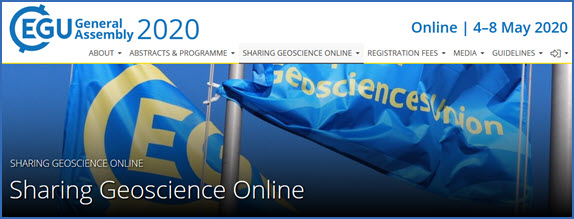
Like many others, I was looking forward to travelling to Vienna in the first week of May to participate in this year's General Assembly of the European Geosciences Union, something I had done and enjoyed in both 2018 and 2019. But, due to the Corona epidemic the in-person event had to be cancelled like so many other gatherings where people would otherwise meet in the hundreds or - like in Vienna - thousands. Something which obviously now couldn't happen. Instead of completely foregoing this year's general assembly, the organisiers decided to do something unprecedented instead and EGU 2020: Sharing Geoscience Online was born!
Here is how this will work according to the website:
EGU2020: Sharing Geoscience Online (#shareEGU20) brings part of the activities of the EGU General Assembly 2020 online. We hope that authors and conveners will join us in sharing their research and discussing with colleagues. From 4 to 8 May 2020 (CEST) everyone can join us online for their favourite sessions.
Participation in EGU2020: Sharing Geoscience Online does not require a separate registration or the payment of a registration fee. For uploads of presentation materials and commenting, authors and participants only need to have a Copernicus user account. Viewing presentation materials and participating in chats does not require registration or login. To organize your participation, please consider preparing your personal programme.
This means, that all the presentation material will be open access and participating in the chat sessions or commenting on the presentations will be free of charge and open to everybody interested! There's a lot of information on the EGU-website of how they plan to pull this off (e.g. the FAQs) - not an easy feat considering that about 18,000 abstracts have been submitted to 700 sessions!
One of these many presentations will be one I submitted together with John Cook for session ITS1.8/SSS1.1 - Bridging between scientific disciplines: Participatory Citizen Science and Open Science as a way to go. Initially we were given a poster for our abstract titled "The story of Skeptical Science: How citizen science helped to turn a website into a go-to resource for climate science" but now - just like everybody else - we were given the opportunity to upload a "display". This could be anything like a graphic, an animation, a video or a presentation as long as its size stayed below 50MB.
Given the amount of material suitable for a mention in our presentation about Skeptical Science, I would have had a pretty hard time boiling things down to make it fit onto a poster! The switch to a display and therefore multi-page presentation suited me just fine and I set to work. The completed presentation has already been uploaded to the EGU website and you can view and download it from its abstract page. The presentation has comments enabled, so it's possible to have a discussion about it. All you need to comment on ours and many other displays is a Copernicus ID. Creating an ID is easy and free of charge but participating in EGU2020: Sharing Geoscience Online, implies that you adhere to EGU's Code of Conduct. Comments will remain publicly available together with the abstract and presentation.
Here is a teaser about the many facets of Skeptical Science mentioned in our presentation:
There's one slide for each of these topics in the presentation containing links to relevant pages on Skeptical Science or related material. Do have a look and mark your calendar for the online chat-session happening on the very first day of EGU 2020: Sharing Geoscience Online on Monday, May 4 from 8:30 to 12:30 CEST. I'm really looking forward to what is bound to become a big experiment in how a large conference like this one can be done online! I plan to write a couple of blog posts throughout the event to share my thoughts and experiences. Stay tuned and "tune in" online from May 4 to 8!
Posted by BaerbelW on Thursday, 16 April, 2020
 |
The Skeptical Science website by Skeptical Science is licensed under a Creative Commons Attribution 3.0 Unported License. |